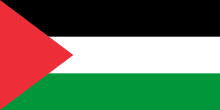
Palestinians are an Arab ethnonational group native to the region of Palestine.

Zionism is an ethnocultural nationalist movement that emerged in Europe in the late 19th century and aimed for the establishment of a national home for the Jewish people through the colonization of Palestine, an area roughly corresponding to the Land of Israel in Judaism, and of central importance in Jewish history. Zionists wanted to create a Jewish state in Palestine with as much land, as many Jews, and as few Palestinian Arabs as possible.
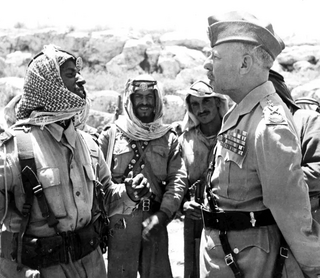
The 1948 Arab–Israeli War, also known as the First Arab–Israeli War, followed the civil war in Mandatory Palestine as the second and final stage of the 1948 Palestine war. The civil war became a war of separate states with the Israeli Declaration of Independence on 14 May 1948, the end of the British Mandate for Palestine at midnight, and the entry of a military coalition of Arab states into the territory of Mandatory Palestine the following morning. The war formally ended with the 1949 Armistice Agreements which established the Green Line.

The Emirate of Transjordan, officially known as the Amirate of Trans-Jordan, was a British protectorate established on 11 April 1921, which remained as such until achieving formal independence as the Kingdom of Transjordan in 1946.
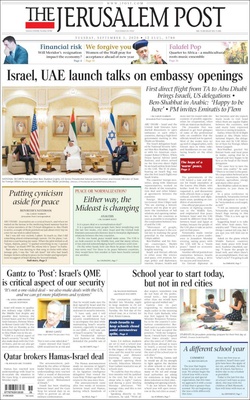
The Jerusalem Post is an English language Israeli broadsheet newspaper based in Jerusalem, Israel, founded in 1932 during the British Mandate of Palestine by Gershon Agron as The Palestine Post. In 1950, it changed its name to The Jerusalem Post. In 2004, the paper was bought by Mirkaei Tikshoret, a diversified Israeli media firm controlled by investor Eli Azur. The Jerusalem Post is published in English. Previously, it also had a French edition.

Palestine, officially the State of Palestine, is a country in the southern Levant region of West Asia recognized by 146 out of 193 UN member states. It encompasses the Israeli-occupied West Bank, including East Jerusalem, and the Gaza Strip, collectively known as the occupied Palestinian territories, within the broader geographic and historical Palestine region. Palestine shares most of its borders with Israel, and it borders Jordan to the east and Egypt to the southwest. It has a total land area of 6,020 square kilometres (2,320 sq mi) while its population exceeds five million people. Its proclaimed capital is Jerusalem, while Ramallah serves as its administrative center. Gaza City was its largest city prior to evacuations in 2023.
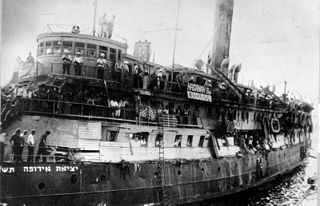
The Jewish aspiration to return to Zion, generally associated with divine redemption, has suffused Jewish religious thought since the destruction of the First Temple and the Babylonian exile.

A popular uprising by Palestinian Arabs in Mandatory Palestine against the British administration, later known as the Great Revolt, the Great Palestinian Revolt, or the Palestinian Revolution, lasted from 1936 until 1939. The movement sought independence from British colonial rule and the end of British support for Zionism, including Jewish immigration and land sales to Jews.
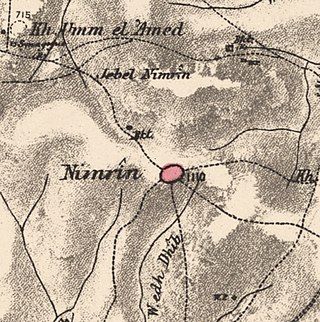
Nimrin was a Palestinian Arab town of 320 that was captured and depopulated by Israel during the 1948 Arab-Israeli War.
As of 2023, the world's core Jewish population was estimated at 15.7 million, which is approximately 0.2% of the 8 billion worldwide population. Israel hosts the largest core Jewry in the world with 7.2 million, followed by the United States with 5.7 million. Other countries with core Jewries above 100,000 include France (440,000), Canada (398,000), the United Kingdom (312,000), Argentina (171,000), Russia (132,000), Germany (125,000), and Australia (117,200). The number of Jews worldwide rises to 18 million with the addition of the "connected" Jewish population, including those who say they are partly Jewish or that have Jewish backgrounds from at least one Jewish parent, and rises again to 21 million with the addition of the "enlarged" Jewish population, including those who say they have Jewish backgrounds but no Jewish parents and all non-Jewish household members who live with Jews. Counting all those who are eligible for Israeli citizenship under Israel's Law of Return, in addition to Israeli Jews, raised the total to 25.5 million.

The Palestine national football team, governed by the Palestinian Football Association, represents Palestine in men's international football. The squad is under the global jurisdiction of FIFA, and is governed continentally by the Asian Football Confederation (AFC).
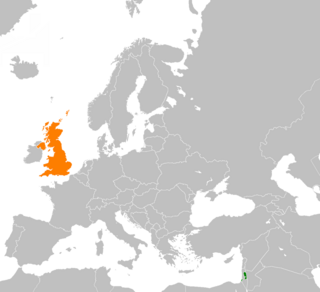
The United Kingdom does not recognise Palestine as a state. The UK has a non-accredited Consulate General in Jerusalem that "represents the UK government in Jerusalem, West Bank, and Gaza", and works on "political, commercial, security and economic interests between the UK and the Palestinian territories". Husam Zomlot became head of the Palestine Mission to the United Kingdom in 2018. The State of Palestine was represented in London by Manuel Hassassian, the Palestinian General Delegate to the United Kingdom between 2005 and 2018. Another former Palestinian General Delegate to the UK was Afif Safieh, who began in that role in 1990. The UK House of Commons voted in favor of recognizing Palestine as a state in 2014, as a contribution towards achieving a negotiated two-state solution. However, the UK government maintained its policy of reserving the right to recognize Palestine bilaterally at a more opportune time for peace efforts.

China–Palestine relations, also referred to as Sino–Palestinian relations, encompass the long bilateral relationship between China and Palestine dating back from the early years of the Cold War.

Relations between the European Union and the Palestine Liberation Organisation (PLO) were established in 1975 as part of the Euro-Arab Dialogue. The EU is a member of the Quartet and is the single largest donor of foreign aid to the Palestinian Authority.
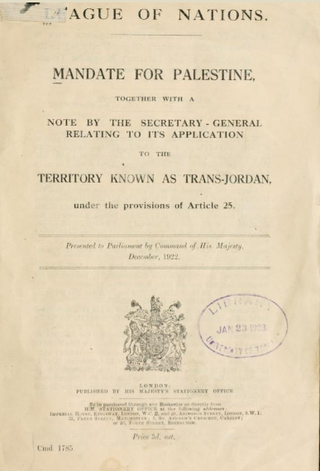
The Mandate for Palestine was a League of Nations mandate for British administration of the territories of Palestine and Transjordan – which had been part of the Ottoman Empire for four centuries – following the defeat of the Ottoman Empire in World War I. The mandate was assigned to Britain by the San Remo conference in April 1920, after France's concession in the 1918 Clemenceau–Lloyd George Agreement of the previously agreed "international administration" of Palestine under the Sykes–Picot Agreement. Transjordan was added to the mandate after the Arab Kingdom in Damascus was toppled by the French in the Franco-Syrian War. Civil administration began in Palestine and Transjordan in July 1920 and April 1921, respectively, and the mandate was in force from 29 September 1923 to 15 May 1948 and to 25 May 1946 respectively.

Mandatory Palestine was a geopolitical entity that existed between 1920 and 1948 in the region of Palestine under the terms of the League of Nations Mandate for Palestine.
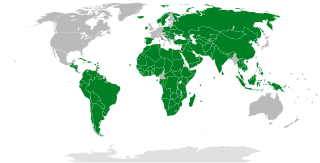
As of June 2024, the State of Palestine is recognized as a sovereign state by 146 of the 193 member states of the United Nations, or just over 75% of all UN members. It has been a non-member observer state of the United Nations General Assembly since November 2012. This limited status is largely due to the fact that the United States, a permanent member of the UN Security Council with veto power, has consistently used its veto or threatened to do so to block Palestine's full UN membership.
The 2018–19 Palestine Cup is the 2018–19 season of the top football cup in Palestine.

The PEF Survey of Palestine was a series of surveys carried out by the Palestine Exploration Fund (PEF) between 1872 and 1877 for the completed Survey of Western Palestine and in 1880 for the soon abandoned Survey of Eastern Palestine. The survey was carried out after the success of the Ordnance Survey of Jerusalem by the newly-founded PEF, with support from the War Office. Twenty-six sheets were produced for "Western Palestine" and one sheet for "Eastern Palestine". It was the first fully scientific mapping of Palestine.
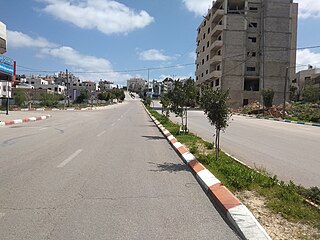
The COVID-19 pandemic in the State of Palestine is part of the worldwide pandemic of coronavirus disease 2019 caused by severe acute respiratory syndrome coronavirus 2. The State of Palestine first identified its cases in the Bethlehem area on 5 March 2020, when a group of Greek tourists who visited a hotel in late February tested positive for the disease. The Hebron district is considered an epicenter of the outbreak. The first two cases in Gaza City, Gaza were diagnosed on 21 March. On 24 August 2020, confirmed cases outside of quarantine centers were recorded.
